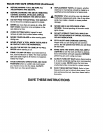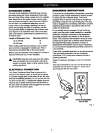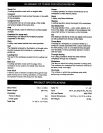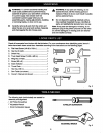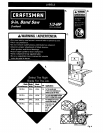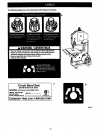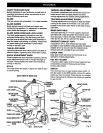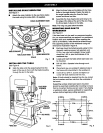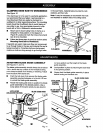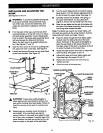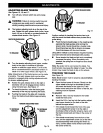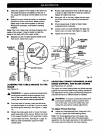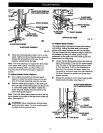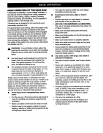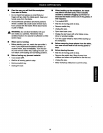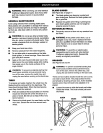
CLAMPING BAND SAW TO WORKBENCH
See Figure 10.
If the band saw is to be used in a portable application,
we recommend that you fasten it permanently to a
mounting board that can easily be clamped to a
workbench or other supporting surface. The mounting
board should be of sufficient size to avoid tipping of
saw while in use. Any good grade plywood or chip-
board with a 3/4 in. thickness is recommended.
Mount saw to board using holes in frame as a
template for hole pattern or the diagram in
Figure 9. Locate and mark the holes where band
saw is to be mounted.
• Follow last three steps in previous section called
Mounting Band Saw to Workbench.
If lag bolts are used, make sure they are long enough
to go through holes in the saw and material the saw is
being mounted to. If machine bolts are being used,
make sure bolts are long enough to go through holes
in the saw frame, material being mounted to, lock
washers, and hex nuts.
Note: It may be necessary to countersink hex nuts
and washers on bottom side of mounting board.
MOUNTING
BOARD "
C-CLAMP(S)
WORKBENCH
Fig. 10
ADJUSTING BLADE GUIDE ASSEMBLY
See Figures 11 and 12.
The blade guide assembly should always be set about •
1/8 in. above the top surface of the workpiece being
cut to keep the blade from twisting or breaking. Adjust •
from the back of the band saw.
• Push the lock lever that secures the blade guide
assembly counterclockwise or to the left 1/4 turn
to unlock the blade guide assembly.
• Rotate the blade guide knob to position the blade
guide assembly to the desired position. Use a
scrap piece of the same wood you are about to
LOCKLEVER
(UNLOCKEDPOSITION)
BLADEGUIDEKNOB
cut as a guide to set the height of the blade
guide assembly.
Lock position in place by returning the lock lever
to its upward position.
Always lock the blade guide assembly in place
before turning on the band saw.
LOCKLEVER
BLADEGUIDEKNOB
POSITION)
BLADEI
k
I
WORKPIECE
®
Fig. 11
13
Fig. 12



